Analysis of Internet Censorship by the Chinese Government
VerifiedAdded on 2019/09/20
|7
|1547
|293
Essay
AI Summary
This essay delves into the intricacies of internet censorship in mainland China, focusing on the Chinese government's restrictions on social networking sites. It explores the underlying causes of this censorship, including concerns about the media's role in disseminating information and the government's desire to maintain control over its citizens. The essay examines the profound effects of these regulations on the Chinese people, limiting their freedom of expression and access to information. Furthermore, it analyzes the various responses of the Chinese population to this control, including their use of online platforms to voice dissent and the consequences they faced. The essay concludes by emphasizing the importance of freedom of speech and expression and the potential long-term consequences of the government's policies.
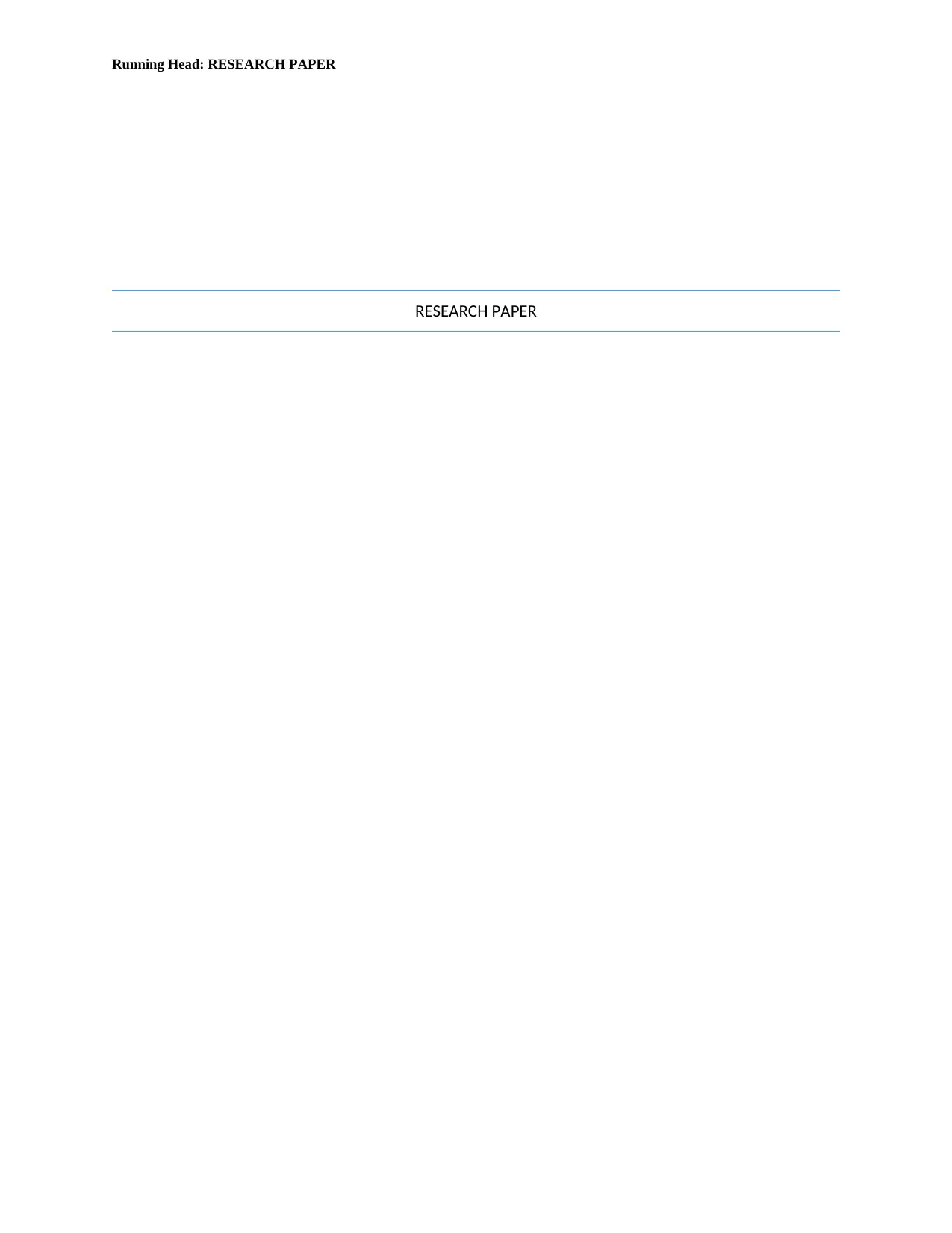
Running Head: RESEARCH PAPER
RESEARCH PAPER
RESEARCH PAPER
Paraphrase This Document
Need a fresh take? Get an instant paraphrase of this document with our AI Paraphraser
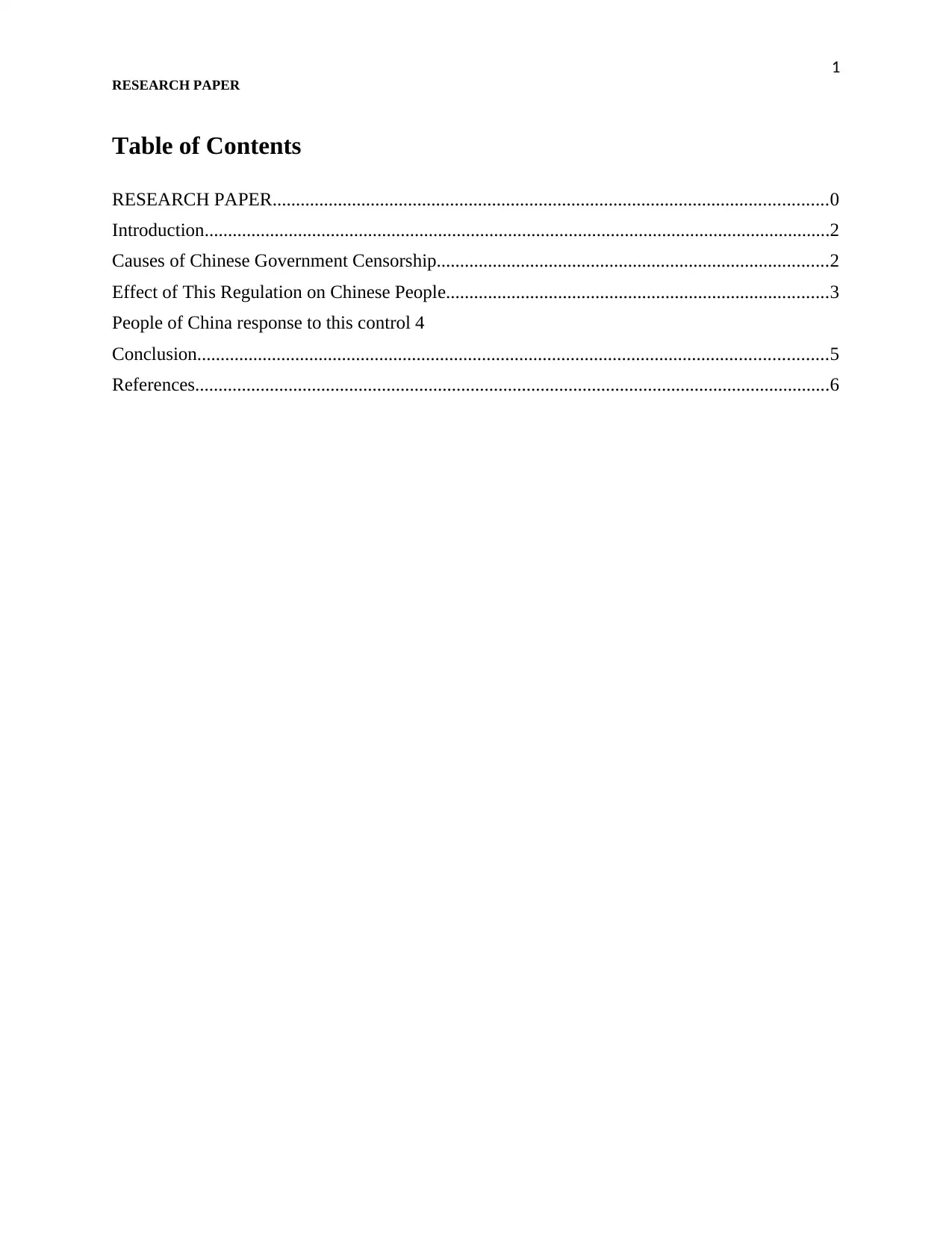
1
RESEARCH PAPER
Table of Contents
RESEARCH PAPER.......................................................................................................................0
Introduction......................................................................................................................................2
Causes of Chinese Government Censorship....................................................................................2
Effect of This Regulation on Chinese People..................................................................................3
People of China response to this control 4
Conclusion.......................................................................................................................................5
References........................................................................................................................................6
RESEARCH PAPER
Table of Contents
RESEARCH PAPER.......................................................................................................................0
Introduction......................................................................................................................................2
Causes of Chinese Government Censorship....................................................................................2
Effect of This Regulation on Chinese People..................................................................................3
People of China response to this control 4
Conclusion.......................................................................................................................................5
References........................................................................................................................................6
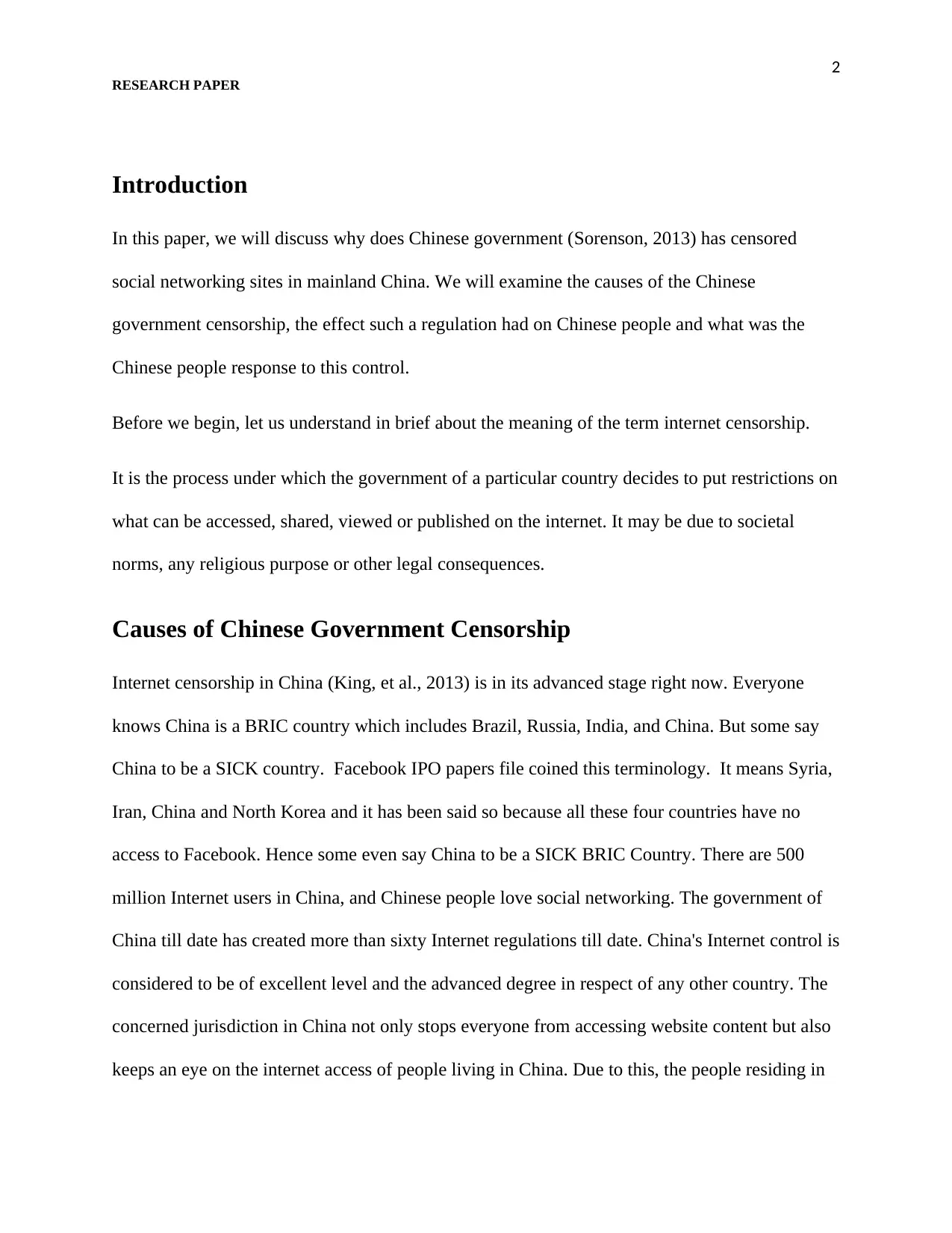
2
RESEARCH PAPER
Introduction
In this paper, we will discuss why does Chinese government (Sorenson, 2013) has censored
social networking sites in mainland China. We will examine the causes of the Chinese
government censorship, the effect such a regulation had on Chinese people and what was the
Chinese people response to this control.
Before we begin, let us understand in brief about the meaning of the term internet censorship.
It is the process under which the government of a particular country decides to put restrictions on
what can be accessed, shared, viewed or published on the internet. It may be due to societal
norms, any religious purpose or other legal consequences.
Causes of Chinese Government Censorship
Internet censorship in China (King, et al., 2013) is in its advanced stage right now. Everyone
knows China is a BRIC country which includes Brazil, Russia, India, and China. But some say
China to be a SICK country. Facebook IPO papers file coined this terminology. It means Syria,
Iran, China and North Korea and it has been said so because all these four countries have no
access to Facebook. Hence some even say China to be a SICK BRIC Country. There are 500
million Internet users in China, and Chinese people love social networking. The government of
China till date has created more than sixty Internet regulations till date. China's Internet control is
considered to be of excellent level and the advanced degree in respect of any other country. The
concerned jurisdiction in China not only stops everyone from accessing website content but also
keeps an eye on the internet access of people living in China. Due to this, the people residing in
RESEARCH PAPER
Introduction
In this paper, we will discuss why does Chinese government (Sorenson, 2013) has censored
social networking sites in mainland China. We will examine the causes of the Chinese
government censorship, the effect such a regulation had on Chinese people and what was the
Chinese people response to this control.
Before we begin, let us understand in brief about the meaning of the term internet censorship.
It is the process under which the government of a particular country decides to put restrictions on
what can be accessed, shared, viewed or published on the internet. It may be due to societal
norms, any religious purpose or other legal consequences.
Causes of Chinese Government Censorship
Internet censorship in China (King, et al., 2013) is in its advanced stage right now. Everyone
knows China is a BRIC country which includes Brazil, Russia, India, and China. But some say
China to be a SICK country. Facebook IPO papers file coined this terminology. It means Syria,
Iran, China and North Korea and it has been said so because all these four countries have no
access to Facebook. Hence some even say China to be a SICK BRIC Country. There are 500
million Internet users in China, and Chinese people love social networking. The government of
China till date has created more than sixty Internet regulations till date. China's Internet control is
considered to be of excellent level and the advanced degree in respect of any other country. The
concerned jurisdiction in China not only stops everyone from accessing website content but also
keeps an eye on the internet access of people living in China. Due to this, the people residing in
⊘ This is a preview!⊘
Do you want full access?
Subscribe today to unlock all pages.

Trusted by 1+ million students worldwide
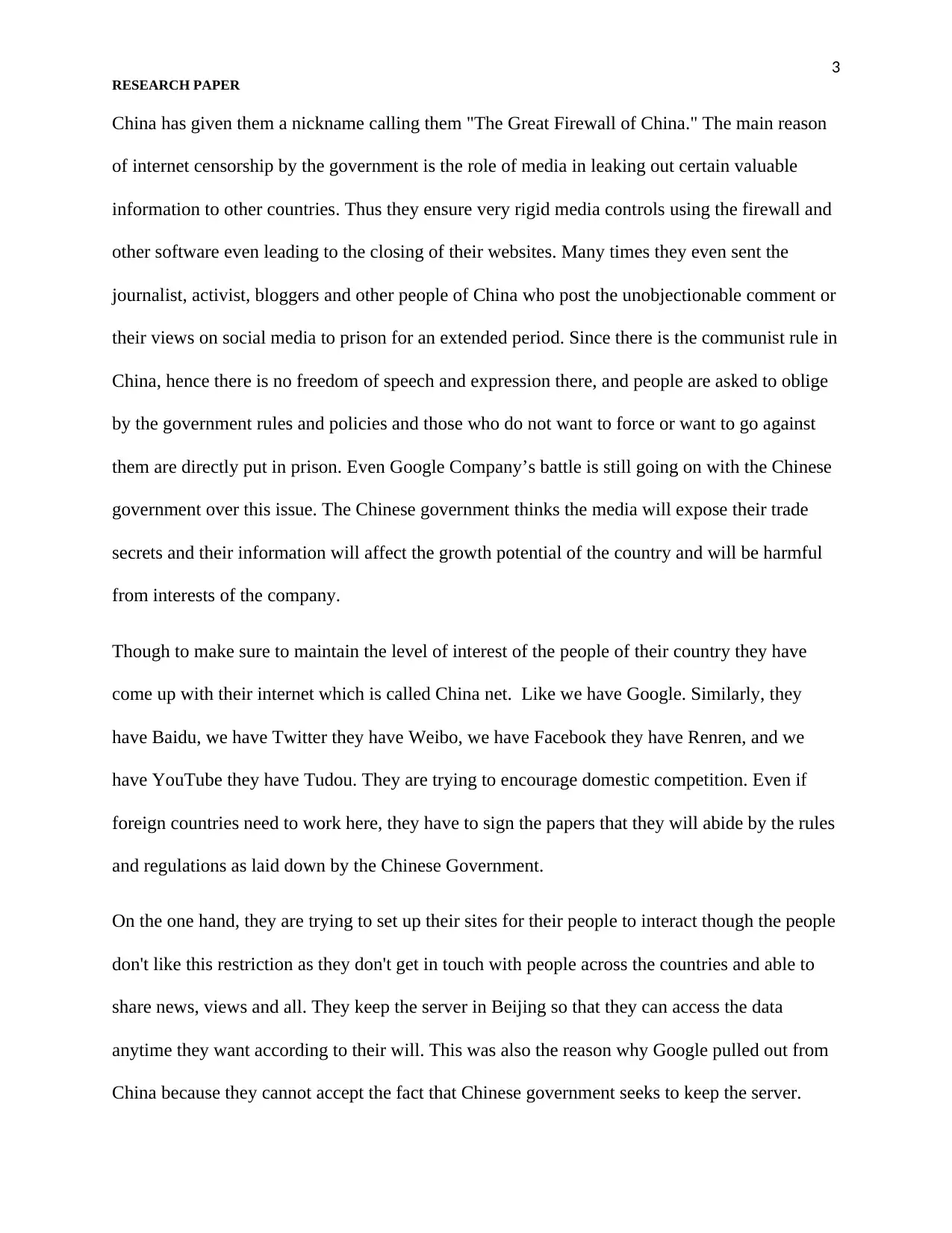
3
RESEARCH PAPER
China has given them a nickname calling them "The Great Firewall of China." The main reason
of internet censorship by the government is the role of media in leaking out certain valuable
information to other countries. Thus they ensure very rigid media controls using the firewall and
other software even leading to the closing of their websites. Many times they even sent the
journalist, activist, bloggers and other people of China who post the unobjectionable comment or
their views on social media to prison for an extended period. Since there is the communist rule in
China, hence there is no freedom of speech and expression there, and people are asked to oblige
by the government rules and policies and those who do not want to force or want to go against
them are directly put in prison. Even Google Company’s battle is still going on with the Chinese
government over this issue. The Chinese government thinks the media will expose their trade
secrets and their information will affect the growth potential of the country and will be harmful
from interests of the company.
Though to make sure to maintain the level of interest of the people of their country they have
come up with their internet which is called China net. Like we have Google. Similarly, they
have Baidu, we have Twitter they have Weibo, we have Facebook they have Renren, and we
have YouTube they have Tudou. They are trying to encourage domestic competition. Even if
foreign countries need to work here, they have to sign the papers that they will abide by the rules
and regulations as laid down by the Chinese Government.
On the one hand, they are trying to set up their sites for their people to interact though the people
don't like this restriction as they don't get in touch with people across the countries and able to
share news, views and all. They keep the server in Beijing so that they can access the data
anytime they want according to their will. This was also the reason why Google pulled out from
China because they cannot accept the fact that Chinese government seeks to keep the server.
RESEARCH PAPER
China has given them a nickname calling them "The Great Firewall of China." The main reason
of internet censorship by the government is the role of media in leaking out certain valuable
information to other countries. Thus they ensure very rigid media controls using the firewall and
other software even leading to the closing of their websites. Many times they even sent the
journalist, activist, bloggers and other people of China who post the unobjectionable comment or
their views on social media to prison for an extended period. Since there is the communist rule in
China, hence there is no freedom of speech and expression there, and people are asked to oblige
by the government rules and policies and those who do not want to force or want to go against
them are directly put in prison. Even Google Company’s battle is still going on with the Chinese
government over this issue. The Chinese government thinks the media will expose their trade
secrets and their information will affect the growth potential of the country and will be harmful
from interests of the company.
Though to make sure to maintain the level of interest of the people of their country they have
come up with their internet which is called China net. Like we have Google. Similarly, they
have Baidu, we have Twitter they have Weibo, we have Facebook they have Renren, and we
have YouTube they have Tudou. They are trying to encourage domestic competition. Even if
foreign countries need to work here, they have to sign the papers that they will abide by the rules
and regulations as laid down by the Chinese Government.
On the one hand, they are trying to set up their sites for their people to interact though the people
don't like this restriction as they don't get in touch with people across the countries and able to
share news, views and all. They keep the server in Beijing so that they can access the data
anytime they want according to their will. This was also the reason why Google pulled out from
China because they cannot accept the fact that Chinese government seeks to keep the server.
Paraphrase This Document
Need a fresh take? Get an instant paraphrase of this document with our AI Paraphraser
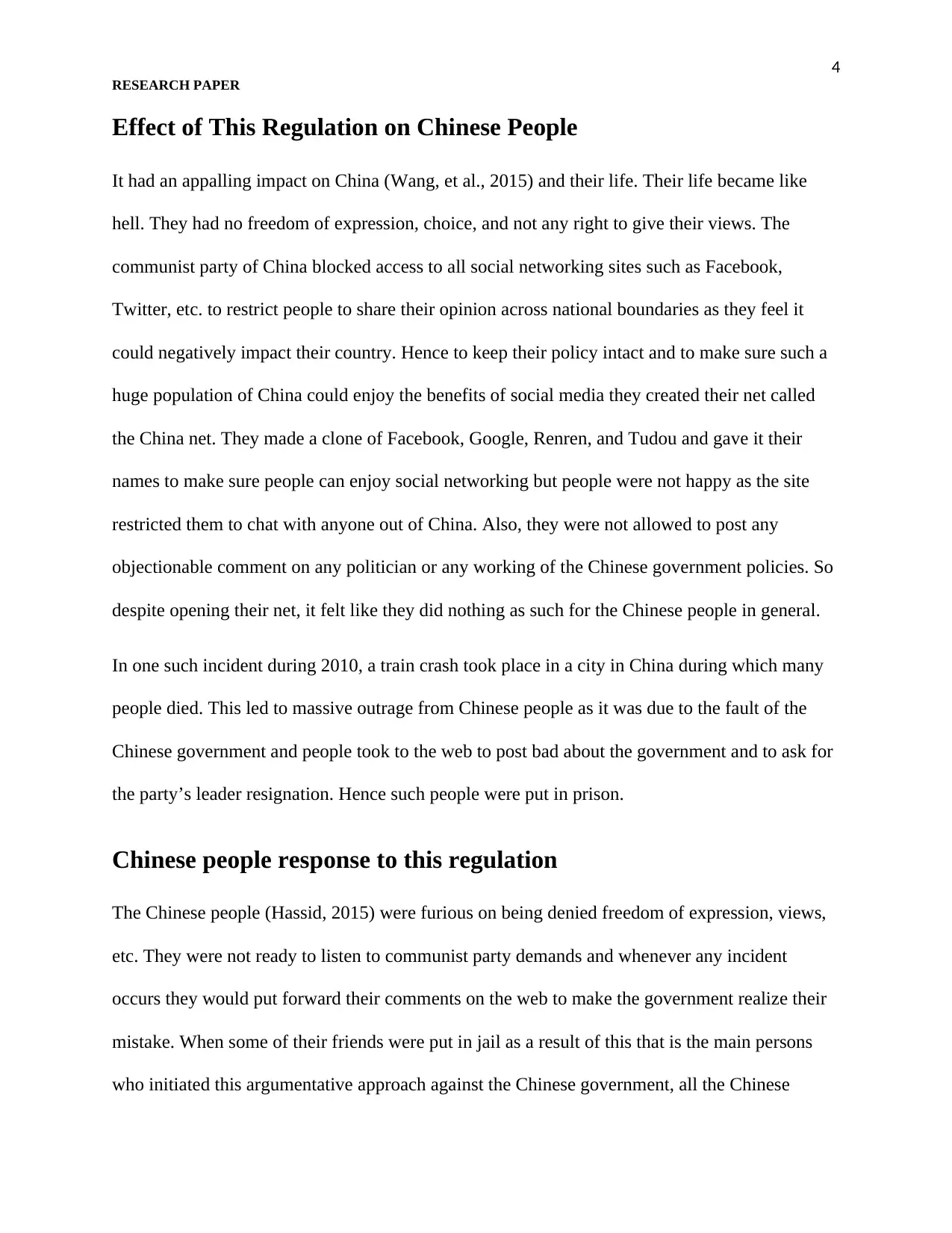
4
RESEARCH PAPER
Effect of This Regulation on Chinese People
It had an appalling impact on China (Wang, et al., 2015) and their life. Their life became like
hell. They had no freedom of expression, choice, and not any right to give their views. The
communist party of China blocked access to all social networking sites such as Facebook,
Twitter, etc. to restrict people to share their opinion across national boundaries as they feel it
could negatively impact their country. Hence to keep their policy intact and to make sure such a
huge population of China could enjoy the benefits of social media they created their net called
the China net. They made a clone of Facebook, Google, Renren, and Tudou and gave it their
names to make sure people can enjoy social networking but people were not happy as the site
restricted them to chat with anyone out of China. Also, they were not allowed to post any
objectionable comment on any politician or any working of the Chinese government policies. So
despite opening their net, it felt like they did nothing as such for the Chinese people in general.
In one such incident during 2010, a train crash took place in a city in China during which many
people died. This led to massive outrage from Chinese people as it was due to the fault of the
Chinese government and people took to the web to post bad about the government and to ask for
the party’s leader resignation. Hence such people were put in prison.
Chinese people response to this regulation
The Chinese people (Hassid, 2015) were furious on being denied freedom of expression, views,
etc. They were not ready to listen to communist party demands and whenever any incident
occurs they would put forward their comments on the web to make the government realize their
mistake. When some of their friends were put in jail as a result of this that is the main persons
who initiated this argumentative approach against the Chinese government, all the Chinese
RESEARCH PAPER
Effect of This Regulation on Chinese People
It had an appalling impact on China (Wang, et al., 2015) and their life. Their life became like
hell. They had no freedom of expression, choice, and not any right to give their views. The
communist party of China blocked access to all social networking sites such as Facebook,
Twitter, etc. to restrict people to share their opinion across national boundaries as they feel it
could negatively impact their country. Hence to keep their policy intact and to make sure such a
huge population of China could enjoy the benefits of social media they created their net called
the China net. They made a clone of Facebook, Google, Renren, and Tudou and gave it their
names to make sure people can enjoy social networking but people were not happy as the site
restricted them to chat with anyone out of China. Also, they were not allowed to post any
objectionable comment on any politician or any working of the Chinese government policies. So
despite opening their net, it felt like they did nothing as such for the Chinese people in general.
In one such incident during 2010, a train crash took place in a city in China during which many
people died. This led to massive outrage from Chinese people as it was due to the fault of the
Chinese government and people took to the web to post bad about the government and to ask for
the party’s leader resignation. Hence such people were put in prison.
Chinese people response to this regulation
The Chinese people (Hassid, 2015) were furious on being denied freedom of expression, views,
etc. They were not ready to listen to communist party demands and whenever any incident
occurs they would put forward their comments on the web to make the government realize their
mistake. When some of their friends were put in jail as a result of this that is the main persons
who initiated this argumentative approach against the Chinese government, all the Chinese
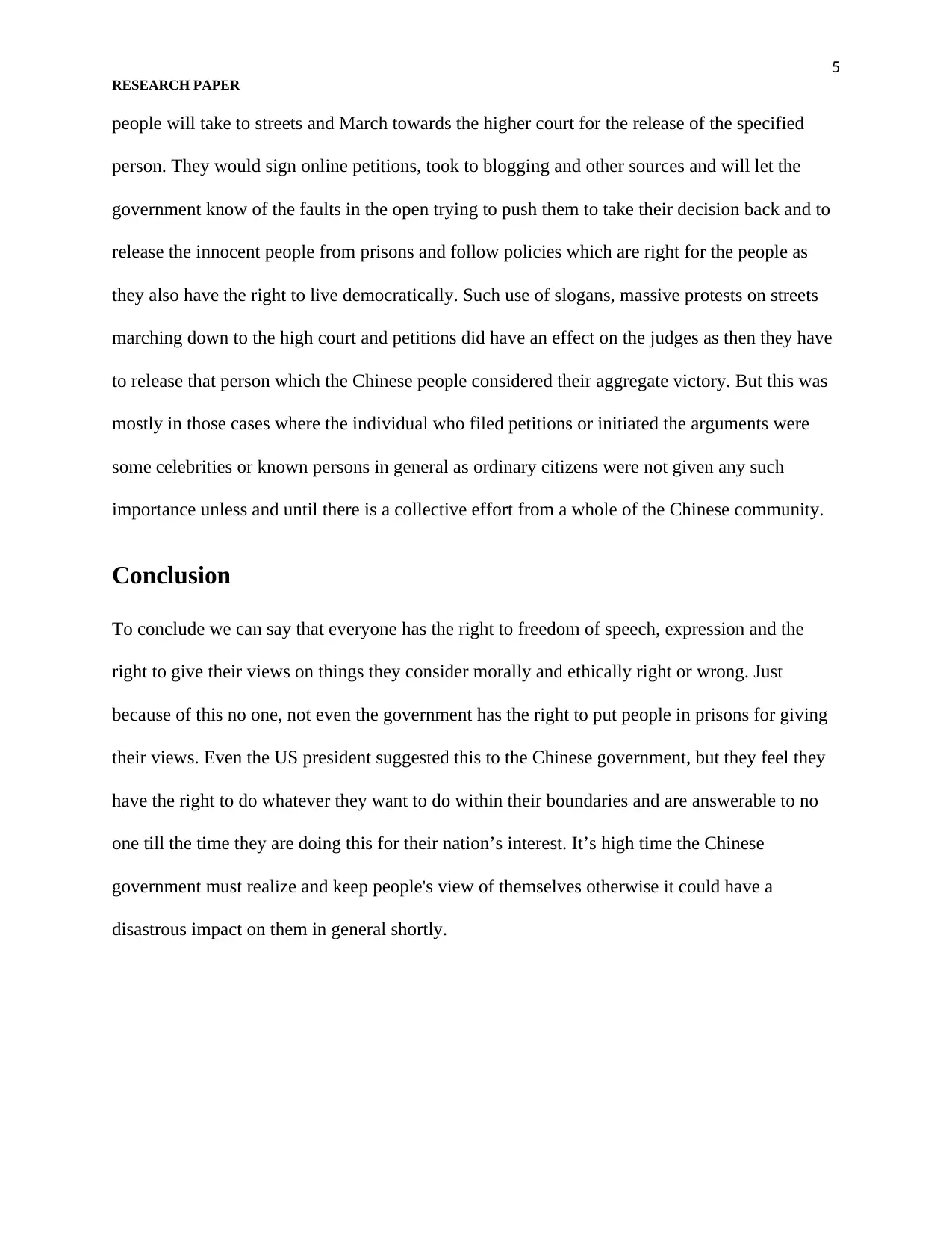
5
RESEARCH PAPER
people will take to streets and March towards the higher court for the release of the specified
person. They would sign online petitions, took to blogging and other sources and will let the
government know of the faults in the open trying to push them to take their decision back and to
release the innocent people from prisons and follow policies which are right for the people as
they also have the right to live democratically. Such use of slogans, massive protests on streets
marching down to the high court and petitions did have an effect on the judges as then they have
to release that person which the Chinese people considered their aggregate victory. But this was
mostly in those cases where the individual who filed petitions or initiated the arguments were
some celebrities or known persons in general as ordinary citizens were not given any such
importance unless and until there is a collective effort from a whole of the Chinese community.
Conclusion
To conclude we can say that everyone has the right to freedom of speech, expression and the
right to give their views on things they consider morally and ethically right or wrong. Just
because of this no one, not even the government has the right to put people in prisons for giving
their views. Even the US president suggested this to the Chinese government, but they feel they
have the right to do whatever they want to do within their boundaries and are answerable to no
one till the time they are doing this for their nation’s interest. It’s high time the Chinese
government must realize and keep people's view of themselves otherwise it could have a
disastrous impact on them in general shortly.
RESEARCH PAPER
people will take to streets and March towards the higher court for the release of the specified
person. They would sign online petitions, took to blogging and other sources and will let the
government know of the faults in the open trying to push them to take their decision back and to
release the innocent people from prisons and follow policies which are right for the people as
they also have the right to live democratically. Such use of slogans, massive protests on streets
marching down to the high court and petitions did have an effect on the judges as then they have
to release that person which the Chinese people considered their aggregate victory. But this was
mostly in those cases where the individual who filed petitions or initiated the arguments were
some celebrities or known persons in general as ordinary citizens were not given any such
importance unless and until there is a collective effort from a whole of the Chinese community.
Conclusion
To conclude we can say that everyone has the right to freedom of speech, expression and the
right to give their views on things they consider morally and ethically right or wrong. Just
because of this no one, not even the government has the right to put people in prisons for giving
their views. Even the US president suggested this to the Chinese government, but they feel they
have the right to do whatever they want to do within their boundaries and are answerable to no
one till the time they are doing this for their nation’s interest. It’s high time the Chinese
government must realize and keep people's view of themselves otherwise it could have a
disastrous impact on them in general shortly.
⊘ This is a preview!⊘
Do you want full access?
Subscribe today to unlock all pages.

Trusted by 1+ million students worldwide
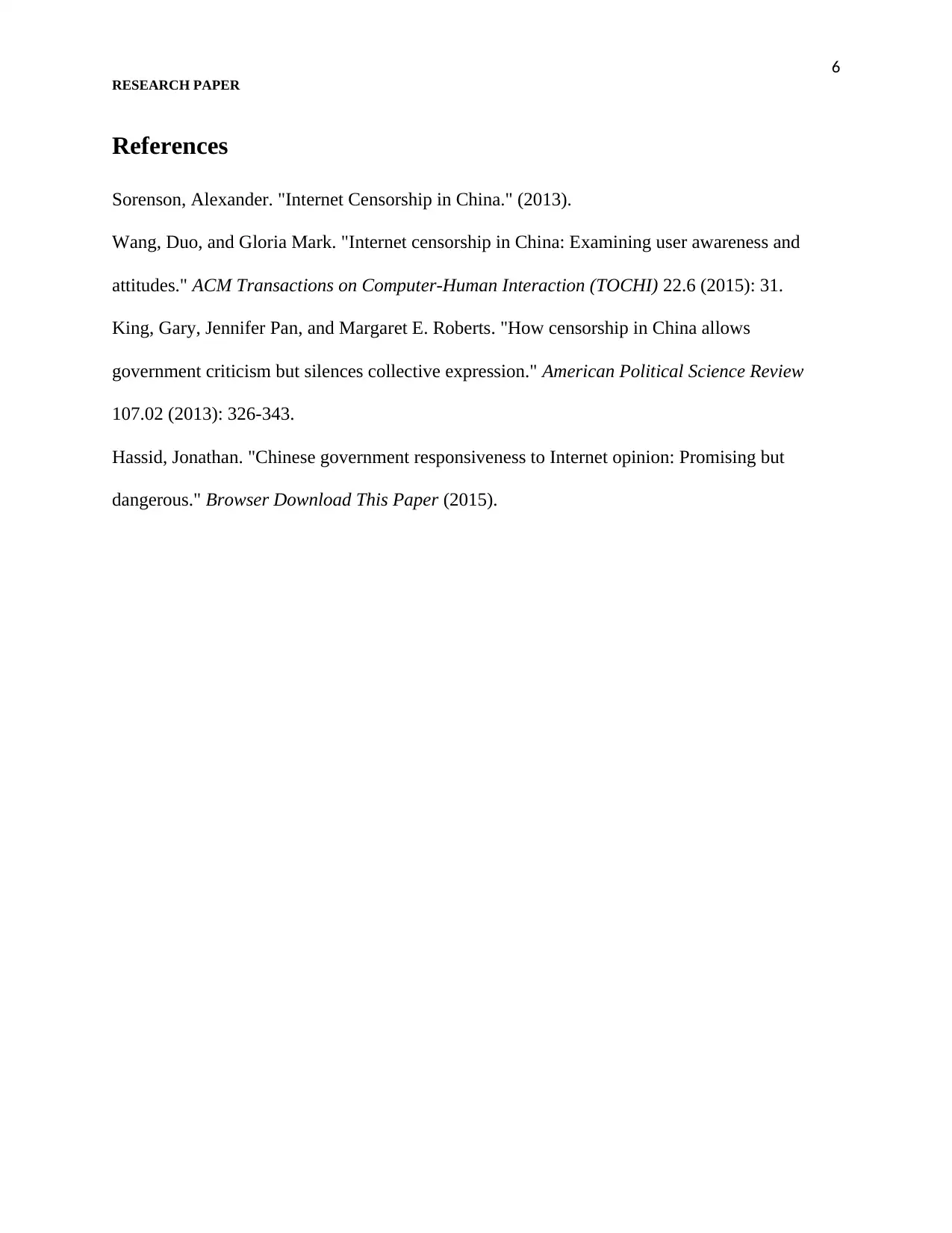
6
RESEARCH PAPER
References
Sorenson, Alexander. "Internet Censorship in China." (2013).
Wang, Duo, and Gloria Mark. "Internet censorship in China: Examining user awareness and
attitudes." ACM Transactions on Computer-Human Interaction (TOCHI) 22.6 (2015): 31.
King, Gary, Jennifer Pan, and Margaret E. Roberts. "How censorship in China allows
government criticism but silences collective expression." American Political Science Review
107.02 (2013): 326-343.
Hassid, Jonathan. "Chinese government responsiveness to Internet opinion: Promising but
dangerous." Browser Download This Paper (2015).
RESEARCH PAPER
References
Sorenson, Alexander. "Internet Censorship in China." (2013).
Wang, Duo, and Gloria Mark. "Internet censorship in China: Examining user awareness and
attitudes." ACM Transactions on Computer-Human Interaction (TOCHI) 22.6 (2015): 31.
King, Gary, Jennifer Pan, and Margaret E. Roberts. "How censorship in China allows
government criticism but silences collective expression." American Political Science Review
107.02 (2013): 326-343.
Hassid, Jonathan. "Chinese government responsiveness to Internet opinion: Promising but
dangerous." Browser Download This Paper (2015).
1 out of 7
Related Documents
Your All-in-One AI-Powered Toolkit for Academic Success.
+13062052269
info@desklib.com
Available 24*7 on WhatsApp / Email
![[object Object]](/_next/static/media/star-bottom.7253800d.svg)
Unlock your academic potential
Copyright © 2020–2026 A2Z Services. All Rights Reserved. Developed and managed by ZUCOL.





